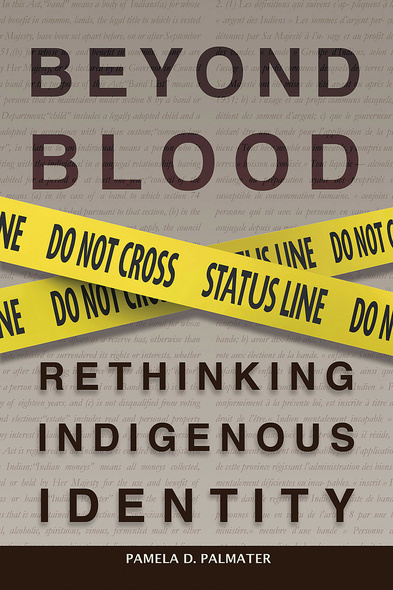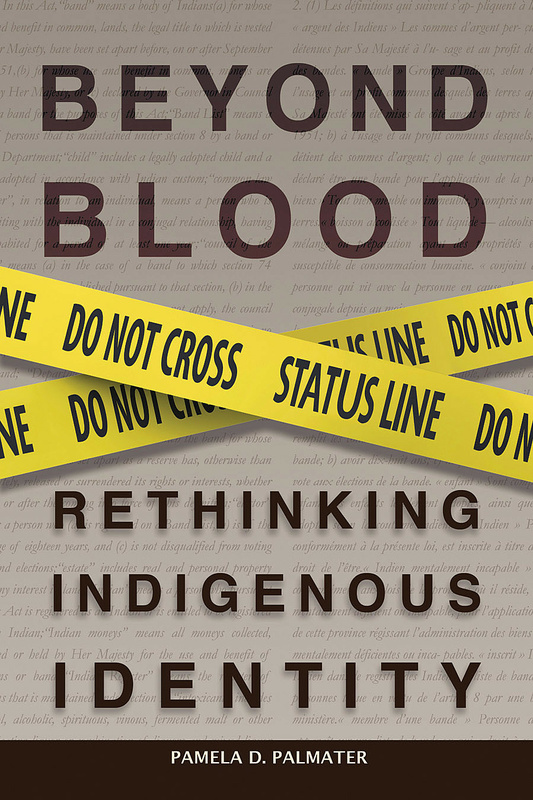
Beyond Blood
Rethinking Indigenous Identity
“For hundreds of years, we have struggled to survive amid a patrilineal system of government. We will not continue to allow government policy to manage our affairs, decide who is Aboriginal or not based on blood quantum …” – Chief Candice Paul, St. Mary’s First Nation
Author Pamela Palmater argues that the Indian Act’s registration provisions will lead to the extinguishment of First Nations as legal and constitutional entities. The current status criteria contain descent-based rules akin to blood quantum that are particularly discriminatory against women and their descendants.
Beginning with an historic overview of legislative enactments defining Indian status and their impact on First Nations, the author examines contemporary court rulings dealing with Aboriginal rights and the Canadian Charter of Rights and Freedoms in relation to Indigenous identity. She also examines various band membership codes to determine how they affect Indigenous identity, and how their reliance on status criteria perpetuates discrimination. She offers suggestions for a better way of determining Indigenous identity and citizenship and argues that First Nations themselves must determine their citizenship based on ties to the community, not blood or status.
Dr. Palmater teaches politics at Ryerson University and holds a JSD in law from Dalhousie University. She was denied Indian status as a Mi’kmaq because her grandmother married a non-Indian.
“It is time that the Indian Act was revised, section by section, in full consultation with First Nations so that we can keep the sections which benefit our communities and finally eliminate those sections which threaten our very existence. Dr. Palmater’s book raises these very important issues…” – Chief Lawrence Paul, Millbrook First Nation
“This work is an important discourse that looks at a judicial anomaly which continues to perplex the integrity of the Canadian legal system, and illustrates the glaring contradictions of an ever-weakening Honor of the Crown.” – Chief Isadore Day, Serpent River First Nation
Dr. Pamela Palmater is a Mi’kmaq lawyer from the Eel River Bar First Nation in northern New Brunswick. She has two children, Mitchell and Jeremy, and a large extended family. Currently, she holds the position of Associate Professor and Chair in Indigenous Governance in the Department of Politics and Public Administration at Ryerson University. Pamela has worked for the federal government on Indigenous legal and governance issues, and has held several director positions at Indian and Northern Affairs Canada.
She completed her doctorate in the Science of Law at Dalhousie University Law School in 2009. She holds a Master of Laws from Dalhousie University in Aboriginal Law, a Bachelor of Laws from the University of New Brunswick, and a BA with a double major in Native Studies and History from St. Thomas University in New Brunswick.
She has published articles related to Aboriginal and treaty rights and has her own website dedicated to these issues. She has specialized in Indigenous identity issues, which include Indian status, band membership, and self-government citizenship and traditional Indigenous citizenship.
She is active in the Indigenous community, volunteering as a board member of Native Child and Family Services Toronto as well as ongoing work with First Nations in Ontario. She regularly appears as a commentator on APTN and has appeared before the House and Senate as an expert witness on legislation affecting Indigenous peoples.
Forewords by First Nations Chiefs / Chief Bill Montour, Six Nations of the Grand River; Chief Candice Paul, St. Mary’s First Nation; Chief Lawrence Paul, Millbrook First Nation; Chief Isadore Day, Serpent River First Nation
Introduction: A Mi’kmaq Woman
1. Legislated Identity: Control, Division, and Assimilation
The Honour of the Crown
Labels and Politics
From Peoples to Indians
The Future of a People
2. The Right to Determine Citizenship
Aboriginal Identity in a Liberal Democracy
Aboriginal Rights in Canada
Powerful Rights and Limits on Power
3. The Right to Belong: Charter Equality for Non-Status Indians
Indian Act Inequality
Charter Equality
Remedying Inequality for Non-Status Indians
4. Band Membership vs. Self-Government Citizenship
Band Membership
Self-Government Citizenship
Rethinking Indigenous Identity and Belonging
Conclusion: Beyond Blood
Appendix
Notes
Index




